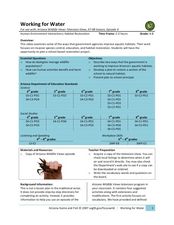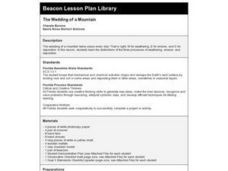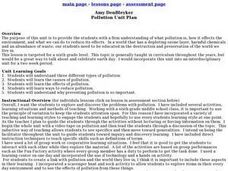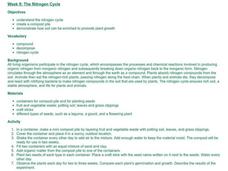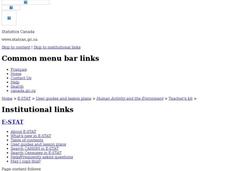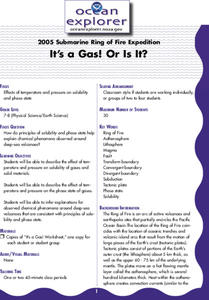Curated OER
Going in Cycles: The Life of an Aluminum Can
Students explore the life cycle of aluminum cans. In this recycling lesson, students review the manufacturing process and how to make a closed loop cycle. Students also have the opportunity to present what they've learned to others...
Curated OER
Working for Water
Students examine the ways that government works to help improve aquatic habitats. In this water habitats lesson plan students view a video and plan a school restoration project.
Curated OER
Erosion Patterns
Fifth graders explore erosion and the different types of sediment. In this erosion patterns lesson plan students complete an activity and divide into groups and conduct an experiment.
Curated OER
Baleen Whales vs. Toothed Whales
Second graders review mammal characteristics and study two types of whales. In this mammal study lesson, 2nd graders discuss mammals and define their five characteristics. Students complete a whale worksheet and define differences...
Curated OER
The Wedding of a Mountain
Pupils examine the differences between weathering, erosion, and deposition as it pertains to mountains.
Curated OER
Pollution Unit Plan
Sixth graders examine what pollution is and the ways in which it effects the environment. They investigate ways to reduce it effects in this unit of lessons.
Curated OER
The Nitrogen Cycle
Pupils design and create a compost pile in order to study the Nitrogen Cycle. They then use the scientific method to determine if plants grow better when they add organic matter from their compost pile to the plant's soil.
Curated OER
What is the Composition of Soil?
Students examine the different components that make up soil. Using data, they identify the components of soil in their local area and discover how scientists use the soil to see how it was formed. They also describe the soil forming...
Curated OER
LOSING GROUND
Students will observe wind erosion and how crop residue prevents erosion.Point out the three kinds of fields to the students. Do as much or as little instruction as needed to explain the pan with crop residue. Conservation tillage...
Curated OER
Bite Sized Core Sampling
Students define the origin of rock samples and how surface core samples can tell us about the history and make-up of Mars. Candies are used as a Martian surface sample. Students study the samples and make a hypothesis about the cause of...
Curated OER
Thermal Waters & Geologic Provinces
Students investigate thermal waters and geologic provinces. They examine provided maps of geothermal springs and thermal wells in the state of Idaho and their locations relative to Idaho's geologic provinces. Afterward, they use the maps...
Curated OER
Sunlight and Warm Air
Pupils discuss radiant energy from the sun, performing a simple experiment with sun glasses and bright light to demonstrate the concept. Students further participate in simple in-class experiments to demonstrate: air density as it...
Curated OER
Solid Waste in Canada
Students develop an understanding of waste and its effects. For this managing waste lesson students participate in one of a few activities including creating a poster, summarizing an article or writing a research paper.
Curated OER
Climate and Temperature
Students explore what the soil temperature would be on the north and south sides of a building. In this temperature lesson, students hypothesize what the results will be using a thermometer and then after a week see what the...
Curated OER
Particle Size and Oil Production
Students investigate how permeable different materials are. In this physics lesson, students determine what affects permeability and how permeability relates to oil production.
Curated OER
Stratigraphy and Cross-Dating
Students interpret archaeological strata using the law of superposition. They apply cross-dating to determine the age of other artifacts.
Curated OER
Three-dimensional cooperative modeling
Middle schoolers explore what is present below the surface in order to drill into the ground and record the type of material that the drill brings to the surface. They discuss the benefits and drawbacks of distance communications. ...
Curated OER
Geology of Yosemite
Young scholars are shown slides of Yosemite and explore how the valley was formed by performing an experiment. Instructions on how to set up the lab are included. They can be assessed orally or by writing a report on the outcome of the lab.
Curated OER
Air Masses
Learners examine the physical characteristics of several types of air masses to discover how air masses can be identified and defined by their temperature and moisture content.
Curated OER
Why Do We Need Petroleum?
Students learn the many ways petroleum is used in our industrial society, and the advantages and disadvantages of its use. They explore what it would be like to live in a world without petroleum.
Curated OER
CO Buildup City
Students conduct a controlled experiment. They collect data in an organized manner. Students analyze data to reach a conclusion and communicate findings. They explain how city size, temperature, and pollution is related to the air quality.
Curated OER
From Ground to Water
Learners explore groundwater and issues relating to groundwater. They discus the problems involving groundwater. Students write a newspaper story addressing groundwater problems. They create a comic strip addressing groundwater...
Curated OER
It's a Gas! Or is it?
Learners discover the principles of solubility and phase state and their influence on chemical phenomena observed around deep-sea volcanoes. They describe the effect of temperature and pressure on solubility of gasses and solid materials.
Curated OER
It Looks Like Champagne
Students determine some practical implications of the discovery of liquid carbon dioxide in deep-ocean ecosystems. They interpret phase diagrams and explain the meaning of "critical point" and "triple point."



